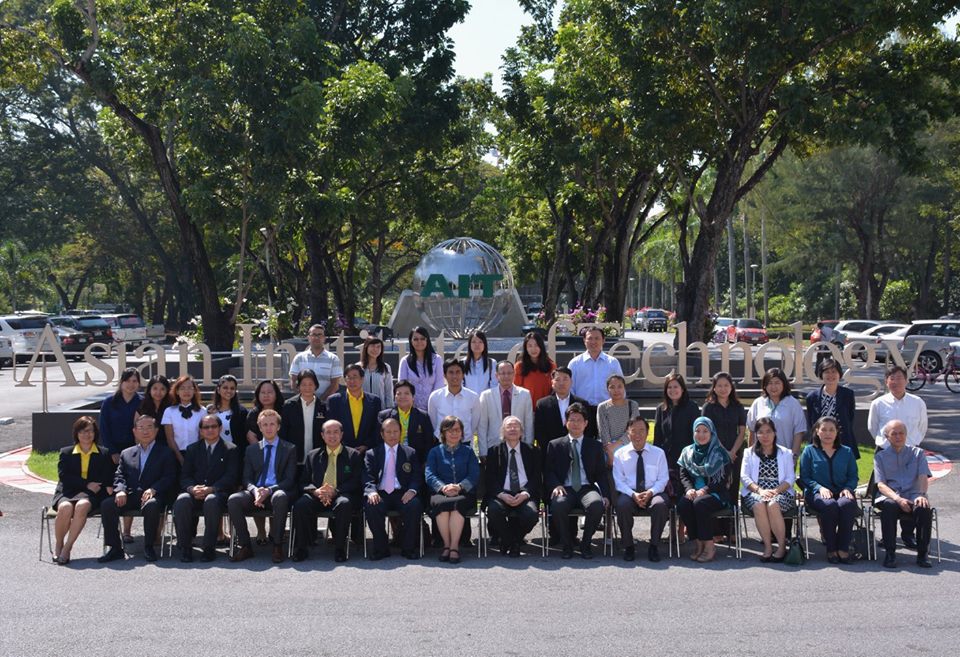"Vulnerability and Adaptation to Climate Change in Coastal Cities of
Southeast Asia," a 4-year, 3-country focused research project conducted
by the Asian Institute of Technology and funded by the International
Climate Initiative (ICI), provided the intellectual backdrop this week
for a meeting of climate change and urban professionals studying ways
to make coastal urban areas more adaptable to climate-related risks.
Enhancing adaptive capacities for implementing climate-sensitive plans
and policies is crucial in the age of climate change, AIT’s Dr. Vilas
Nitivattananon said at the opening of the one-day workshop on 9
December 2014.
Titled "Challenges and Opportunities for Climate Compatible Adaptive
Urban Development in Southeast Asia", the event was organized and
hosted by AIT in partnership with Thai City Planners Society (TCPS),
and in collaboration with the Office of Natural Resources and
Environmental Policy and Planning (ONEP), United Nations Human
Settlements Program (UN-Habitat), Ho Chi Minh City University of
Technology, Urban and Regional Development Institute (URDI) and
ICI.
PHOTO GALLERY
The workshop drew together 45 academicians, practitioners and
policy-makers to share relevant experiences and lessons derived from
the AIT-ICI project and other new knowledge emerging in relation to
urban development and climate change. AIT Vice President for Research
Prof. Kanchana Kanchanasut and TCPS President Mr. Akhom Vephasayanant
delivered welcome remarks.
Representing UN-Habitat, Mr. Liam Fee delivered a keynote presentation
titled "Climate Compatible Urban Development in Southeast Asia."
Kastetsart University's Dr. Eggarin Anukulyudhathon delivered a follow
up keynote address on "Urban Development in the Context of Climate
Change."
Led by principal investigator Dr. Vilas Nitivattananon of the Urban
Environmental Management Field of Study at the AIT School of
Environment, Resources and Development, the study concluded that
riverine flooding, drought, and coastal erosion have greatly impacted
15 cities studied in Indonesia, Vietnam and Thailand.
The research project -- which included collaborators from Ho Chi Minh
University of Technology, Urban and Regional Development Institute,
Indonesia, and Chumchonthai Foundation, Thailand -- recommended that
major adaptation improvements be introduced into the planning, design
and operations of urban water-related sector activities.
Eighty percent of Southeast Asia’s population of 500 million people
live within 100 kilometers of the coast, said Dr. Vilas, explaining
that Padang and Manokwari in Indonesia, Cha-am, Phuket, in Thailand,
and Hoi An and Ben Tre in Vietnam, all cities studied in detail, are
vulnerable to hazards such as flooding, storm surge, coastal erosion,
water scarcity, salinity intrusion and flooding and drought.
Participants recommended a number of specific adaptation strategies
and key actions for the each city in sectors such as water and
infrastructure, tourism, fishery, housing and settlements, and
industry. It identified risks along coastlines, public areas, inner
areas and sub-urban areas.
The workshop featured relevant case studies from the three countries,
as well as lessons learned from Thai cities, including presentations on
policies and practices for climate change adaptation, policy and
implementation in Bangkok, and experiences on successful city
adaptation techniques for floods. The event concluded with discussions
on partnership development and ideas for dissemination of shared views,
experiences and development strategies.


